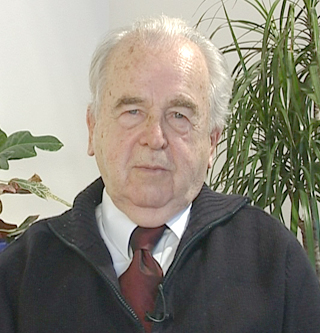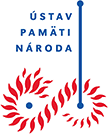Milan Píka (1922)

Biography:
“We should let the truth connect us, Slovaks and Czechs, to avoid doing the same mistakes in the future that we witnessed in the past…”
Milan Píka was born on July 28, 1922, in Moravia’s town of Hranice as the only son of general Heliodor Píka and Mária Píková. He attended a council-school in his hometown but when his father came home from Paris where he had studied at the Paris Military School and started to work at the Ministry of Defence and the General staff of the Czechoslovak army in Prague, Milan pursued his studies there. His father was appointed to the post of attaché in Romania, so Milan went back to Hranice where he attended the first class of the grammar school. Later, when his father’s work in Romania was terminated, he had to return to Prague and pursue his studies at the state grammar school of T.G. Masaryk. German armed forces started to occupy the area of Bohemia and Moravia what forced him to leave the school very quickly. Members of the resistance movement helped him and his mother to flee to Romania. Then they were transported by boat to France. They also stayed in Paris for several months. In this period of life, he tried to join up the Czechoslovak army units formed in France. His plans were thwarted because they found him too young and because German troops were still approaching. Thanks to the colonel Berounský, Milan managed to leave for Great Britain where he joined the British Royal Air Force and passed the leaving examination, too. After finishing his studies, he asked for placing him to an aviation course. He longed for being a navigating officer. However, the general medical examination revealed his congenital eye defect, so he couldn’t work as a member of the flying staff. In 1944 he became an aide-de-camp of the Czechoslovak depot’s commander at RAF airbase in Cosford where he worked until the end of war. After the end of war Milan came back to his homeland and started studying law at the Charles University. He stayed in the army and was assigned to the post at the Regional Military Court in Prague. Right there he came to realize that something was amiss with events in the post-war Czechoslovakia. His father was arrested after the coup d’état in February 1948 and Milan was redeployed to the Legal Department of the Ministry of Defence. The State Security arrested him soon and he was tried with the group of general Mrázek. They accused him of preparations of his father’s abduction to abroad. There was the lack of evidence and also thanks to the intervention of the President Klement Gottwald, Milan was cleared of the charge. In spite of it, he was demoted, dismissed from school, exiled from Prague and as a punishment he should have worked in Jáchymov uranium mines. Doctor Milan Polák, his father-in-law, arranged that he didn’t have to go to Jáchymov and could move to Bratislava. He came to know about his father’s execution by the phone on March 28, 1949. Together with his wife, they immediately travelled to Bory prison in Pilsen where he spent the last night with his father, general Píka. He promised to clean father’s name, so he asked for reopening of his case in the year 1968. They complied with his request and declared the old judgment void. General Heliodor Píka was then cleared of charge and given all his ranks and honours back. However, nobody was found guilty of the wrongful sentence of general Píka. During the period of normalization, the process of clearing his father’s name slowed down. Milan managed to do that completely yet after the year 1989.
Coming Home after the War
“When coming home in 1945, in September actually, I stayed soldiering and became the career soldier. While being employed, I started to study law at the Charles University. I worked, in reality I was assigned the post at the air force headquarters, at the airport in the town Gbely. Lastly, as an officer in the Czechoslovak army I worked at the Regional Military Court on Kapucínska street in Prague. I asked for support because while being employed, I was also a student of law and I wanted to take advantage of my knowledge I had gained thanks to my studies, I wanted to get closer to the law issues, so they agreed and assigned me to work at the Regional Military Court.”
Something Was about to Happen
“In years 1946 and 1947 I studied hard, attended lectures, passed exams and I even got to the sixth term at the Faculty of Law. At the end of the year 1947 I had already comprehended the entire political circumstances and the situation as well and I suspected and supposed that events were not being developed as we could probably wish.”
Emigrations of High Military Representatives
“Once when I was on a visit in hospital, just before they took him [my father] away, the situation in the state culminated so much that many well known people left the Republic and emigrated abroad. As for our social class, namely army, for example general Ferienčík and general Hasál with family emigrated as well. The news spread very quickly back then; it had taken only one or two days since we came to know about it.”
Arrest and Accusation
“It was about November 11, 1948, when I had a visit in my office at the Ministry of Defence. It was like in a film. Two men in leather coats came and said: “Captain Píka, come with us.” I went and they took me to the general staff at the fifth floor, there were small rooms and one of them was my cell. There they began with interrogation. They were convinced that I had prepared my father’s escape abroad and that I wanted to deliver him to Anglo-American Secret Intelligence Service. I had denied everything; however, they showed me the protocol written together with the general Rásek, my father’s good friend. We have already recalled that I talked about it with him back then. Well, he wrote there that he had spoken with the son about that abduction, that he had really prepared it. They made a criminal case of it, although nothing had happened indeed, no preparations, it was just a discussion.”
Trial and Judgement
“My trial was held since February 16, 1949, and I was tried within the group because then it was usual to include every accused person in some group, namely in an anti-state one. I was included in the group of general Mrázek, first lieutenant Púza who was my colleague at the Regional Military Court, colonel Jandera, Táborský and one more. Then at the court I realized that it ended up quite well for me because together with doctor Púza and colonel Jandera, we were dismissed for lack of evidence. It meant that our guilt was obvious but there was just the lack of evidence. Surely, many years later it was proved that our trial was a political one in which the sentence had been predetermined for everyone involved.”
Cleared of the Charge but Sentenced
“Well, thanks to the President Gottwald it was said in my case that: “We have to release him, younger Píka, to avoid that the west could think we punish the whole families.” They released me from prison; however, I was given a ticket to Jáchymov mines, I was also demoted from captain to common soldier and I was dismissed from the Charles University. It means that though I wasn’t sentenced to imprisonment, I was punished the other way; I lost my civic pride and the chance to assert myself in life.”
The story and videoclips of this witness were put together and published thanks to the financial support of EU within the programme Europe for Citizens – Active European Remembrance.


Updated at: 04.03.2024
Print Tweet